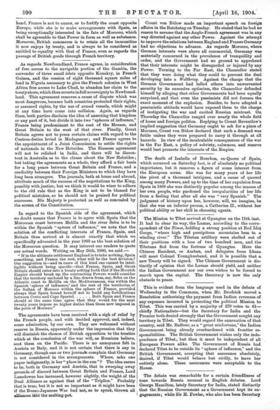The agreements have been received with a sigh of relief
by the French people, and with decided approval, and, indeed, some admiration, by our own. They are welcomed without reserve in Russia, apparently under the impression that they will diminish the chance of British opposition to the treaties which at the conclusion of the war will, as Russians believe, seat them on the Pacific. There is no annoyance felt in Austria or Italy, and it is not certain that there is any in Germany, though one or two journak3 complain that Germany is not considered in the arrangements. Where, asks one paper indignantly, is her" place in the sun" P The idea seems to be, both in Germany and Austria, that in sweeping away grounds of discord between Great Britain and France, Lord Lansdowne has increased, however slightly, the weight of the Dual Alliance as against that of the " Triplice." Probably that is true; but it is not so important as it might have been if the Russo-Japanese War had not, so to speak, thrown all alliances bite the melting-pot. This is evident from the language used in the debate of Wednesday in the Commons, when Mr. Brodriok moved a Resolution authorising the payment from Indian revenues of any expenses incurred in protecting the political Mission to Tibet. This was carried by a majority of 270 votes to 61— chiefly Nationalists—but the Secretary for India and the Premier both denied strongly that the Government sought any territory in Tibet. They would regard the annexation of that country, said Mr. Balfour, as a "great misfortune," the Indian Government being already overburdened with frontier re- sponsibilities. The British Government wishes only the inde- pendence of Tibet; but then it must be independent of all European Powers alike. The Government of Russia had declared Tibet to be outside its "sphere of influence," and the British Government, accepting that assurance absolutely, desired, if Tibet would behave but civilly, to leave her entirely alone. These assurances were exceptable to the House.
The debate was remarkable for a certain friendliness of tone towards Russia unusual in English debates. Lord George Hamilton, lately Secretary for India, stated distinctly that the Russian Government as a Government kept its en- gagements; while Sir H. Fowler, who also has been Secretary






































 Previous page
Previous page